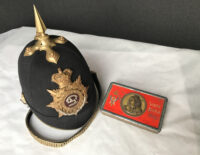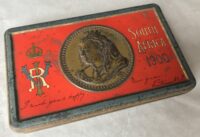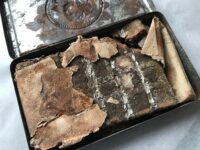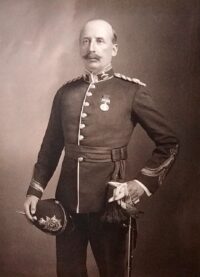 A 121-year-old chocolate bar still in its original wrapper and tin has been discovered in a helmet case in the attic of Oxburgh Hall, family seat of the Bedingfield baronets. The chocolate and helmet belonged to Sir Henry Edward Paston-Bedingfield, 8th Baronet, who was a major in the King’s Liverpool Regiment and fought in the Second Boer War. He was still in South Africa in 1902 when his father died. He returned to Oxburgh to claim his ancestral home and title. The chocolate went with him.
A 121-year-old chocolate bar still in its original wrapper and tin has been discovered in a helmet case in the attic of Oxburgh Hall, family seat of the Bedingfield baronets. The chocolate and helmet belonged to Sir Henry Edward Paston-Bedingfield, 8th Baronet, who was a major in the King’s Liverpool Regiment and fought in the Second Boer War. He was still in South Africa in 1902 when his father died. He returned to Oxburgh to claim his ancestral home and title. The chocolate went with him.
 These chocolate bars were a New Year’s present from Queen Victoria to British troops in South Africa ringing in the turn of the century. More than 100,000 half-pound tins of chocolate bearing her embossed profile and New Year’s wishes in her own handwriting were produced by Britain’s top three chocolate companies, Fry, Cadbury and Rowntree. It was an awkward commission because all three companies were founded and run by devout Quakers who specifically sought out an “innocent trade” that would allow them to make a good living without having to compromise their pacifist principles. Victoria wouldn’t let them decline to profit from selling chocolates for troops fighting in an active war zone, so all three companies were strong-armed into it.
These chocolate bars were a New Year’s present from Queen Victoria to British troops in South Africa ringing in the turn of the century. More than 100,000 half-pound tins of chocolate bearing her embossed profile and New Year’s wishes in her own handwriting were produced by Britain’s top three chocolate companies, Fry, Cadbury and Rowntree. It was an awkward commission because all three companies were founded and run by devout Quakers who specifically sought out an “innocent trade” that would allow them to make a good living without having to compromise their pacifist principles. Victoria wouldn’t let them decline to profit from selling chocolates for troops fighting in an active war zone, so all three companies were strong-armed into it.
 They managed to keep their brands off the tin, but even on that matter the Queen was less than flexible, insisting their names be somewhere on the chocolate or wrappers so the troops would know she was sending them the best British chocolate. The bars/wrappers weren’t all marked, however, and the Oxburgh bar has no surviving brand.
They managed to keep their brands off the tin, but even on that matter the Queen was less than flexible, insisting their names be somewhere on the chocolate or wrappers so the troops would know she was sending them the best British chocolate. The bars/wrappers weren’t all marked, however, and the Oxburgh bar has no surviving brand.
The gesture was popular, and soldiers kept the tins as keepsakes. They do crop up for sale every once in a while, empty tins, mostly, although the chocolate does survive rarely. (Not in any kind of condition to even contemplate ingesting it, of course.) Henry’s bar is an especially rare  survival because it is directly connected to the person who received in South Africa in 1900.
survival because it is directly connected to the person who received in South Africa in 1900.
The chocolate was discovered when staff and the family of Sir Henry’s daughter, Frances Greathead, began cataloguing items following her death in 2020 at the age of 100. Frances, along with her mother Sybil and cousin Violet, were instrumental in saving Oxburgh Hall from being sold at auction in 1951. After selling their houses to raise the necessary funds, all three women moved back to live at Oxburgh before donating it to the National Trust. Frances moved to South Africa in 1956, but still returned to her apartment at Oxburgh every summer.